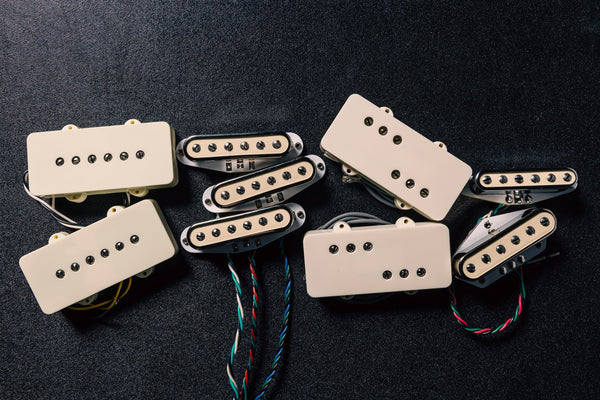
Origins and Construction: Single-coil pickups, as the name suggests, consist of a single coil of wire wrapped around magnets. They were first introduced in the 1920s and became popularized in the 1950s with the rise of electric guitars like the Fender Stratocaster and Telecaster. Single-coil pickups are known for their bright, clear, and articulate sound, characterized by a distinctive "twang" that's favored in genres like country, surf rock, and blues.
On the other hand, humbuckers were developed in the 1950s as a solution to the inherent noise and hum issues of single-coil pickups. Humbuckers feature two coils of wire wound in opposite directions and connected in series or parallel. This design cancels out the electromagnetic interference, or "bucking the hum" if you will, resulting in a higher output and less noise. Due to the noise cancelation qualities of humbuckers, they are preferred if you want to have ultra-high gain solos. Humbuckers are often associated with warmer, thicker tones, making them a popular choice for genres like hard rock, heavy metal, and even jazz.

Tonal Characteristics: The tonal differences between single-coil pickups and humbuckers are significant and can be attributed to various factors, including coil construction, magnet type, and wiring configuration.
Single-coil pickups tend to deliver a bright and crisp sound with excellent clarity and definition. They excel at capturing the nuances of playing dynamics and are prized for their sparkling highs, tight lows, and scooped midrange. Single-coil pickups are renowned for their twangy, bell-like tones, making them ideal for genres that require cutting through the mix, such as country, funk, and indie rock.
Humbuckers, on the other hand, offer a thicker, meatier sound with enhanced midrange warmth and sustain. The dual-coil design results in a higher output and a more powerful signal, delivering rich harmonics and a smoother frequency response. Humbuckers are capable of producing fat, creamy overdriven tones with plenty of punch and depth, making them well-suited for styles like hard rock, metal, and blues-rock.
Performance and Versatility: Both single-coil pickups and humbuckers have their strengths and limitations when it comes to performance and versatility.
Single-coil pickups are prized for their clarity and articulation, making them ideal for clean and lightly overdriven tones. They excel in situations where precision and definition are paramount, such as intricate chord work, arpeggios, and chicken-picking techniques. However, single-coil pickups are more susceptible to interference from external sources, resulting in potential noise issues, especially in high-gain settings or environments with electromagnetic interference.
Humbuckers, on the other hand, offer greater output and sustain, making them well-suited for heavier styles of music and high-gain applications. They produce a thicker, more compressed sound that's conducive to power chords, palm-muted riffing, and soaring leads. Humbuckers also tend to handle distortion and overdrive more gracefully, producing a smooth and saturated tone with plenty of sustain. However, some players find that humbuckers lack the clarity and definition of single-coil pickups, particularly in clean or low-gain settings.


